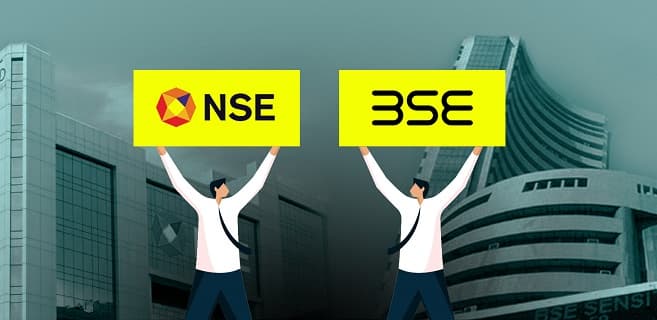There are two major stock exchanges in India that handle the vast majority of equity share trading. The first one is the (NSE) National Stock Exchange, and the second is the (BSE), Bombay Stock Exchange. These two stock markets are not only the largest in India but also in Asia, ranking fourth and fifth in the region after Japan, China, & Hong Kong, respectively.
Every trader or investor must be familiar with the BSE and NSE stock markets and the fundamental differences between them. If you’re trying to decide between the National Stock Exchange (NSE) and the Bombay Stock Exchange (BSE), the following might assist.
What is NSE?
This National Stock Exchange was established in 1992 and is now the largest stock exchange in India related to market capitalization. The National Stock Exchange (NSE) was the first in India to implement an entirely automated trading system using electronic means. Trading stocks using physical certificates has been supplanted by the current computerized approach in recent years.
NIFTY is a benchmark index that is used by the stock market (National Fifty). The NIFTY index is based on the fifty most actively traded and largest firms listed on the National Stock Exchange (NSE). Furthermore, NSE has lately been recognized as the biggest derivatives exchange in the world.
What is BSE?
The National Stock Exchange’s (NYSE) forerunner was the Bombay Stock Exchange. In 1875, under the name “The Native Share and Stock Brokers Association,” the BSE opened for business. The BSE has been operating longer than any other stock exchange in Asia. However, this Bombay Stock Exchange (BSE) did not make the transition to electronic trading (BOLT) until 1995, far after the NSE had already transformed.
The (BSE) also maintains its benchmark index, called SENSEX, which is quite similar to NIFTY (Sensitive Index). It was established in 1986 as a weighted average of the market capitalizations of the 30 largest publicly traded firms.
Although the equities trading on both the BSE and NSE take place between 9:15 AM and 3:30 PM
Key differences between NSE and BSE

Now that you have a better understanding of BSE and NSE, I’d like to provide you with more details that emphasize the key distinctions between the two.
Incorporation
It has been operating continuously since the 18th century, making BSE an oldest stock exchange in Asia. As a counterpoint, NSE just emerged as a distinct field of study during the last 30 years. The BSE is the tenth largest stock exchange in the world, while the NSE is the eleventh.
Electronic trading
In terms of electronic trading, this National Stock Exchange is ahead of the Bombay Stock Exchange (BSE). Since its inception, the National Stock Exchange (NSE) has been a paperless trading platform that operates only through electronic means. In contrast, BSE used a paper-based method for many years until adopting electronic trading in 1995 with the launch of BSE Online Trading (BOLT).
Derivative contracts
NSE has a big head start and it has effectively monopolized the futures contracts market. Two of the most actively traded contracts in India’s derivatives market are indices listed on the National Stock Exchange. These indexes are the NIFTY 50 and the Bank NIFTY. By contrast, investor and trader volumes on the BSE are far smaller.
Listed companies number
When looking at the total number of firms listed on each exchange, the Bombay Stock Exchange dominates the NSE. In comparison to the BSE’s over 5,000 listed firms, the NSE’s total number of listed companies is over 1600. While the disparity between the BSE and NSE in this aspect is shocking, it is not surprising given the BSE’s far longer history.
Stock exchange listing
The BSE is the only exchange in India that is publicly traded. The NSE is the platform on which the BSE is listed. Although the NSE intended to go public as well, it was unable to do so owing to several legal roadblocks.
Conclusion
The Bombay Stock Exchange (BSE) and the National Stock Exchange (NSE) are two of the world’s most successful stock markets. The BSE is an excellent place to begin trading since it has over five thousand different firms listed.
On the other hand, experienced investors and traders will find the National Stock Exchange’s extensive derivative contract offerings to be ideal. Knowing the primary distinction between the National Stock Exchange and the Bombay Stock Exchange, you are now prepared to begin trading on the stock market of your choosing.
Santosh Kumar, the author behind IndiasStuffs.com, is passionate about sharing valuable insights on a variety of topics, including lifestyle, technology, and Indian culture.
Page Contents

